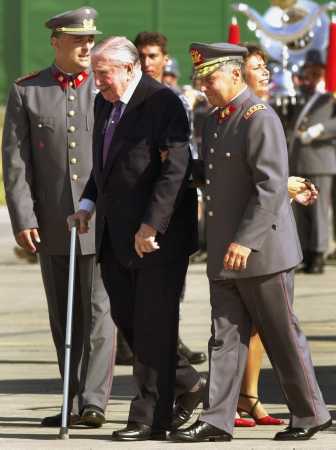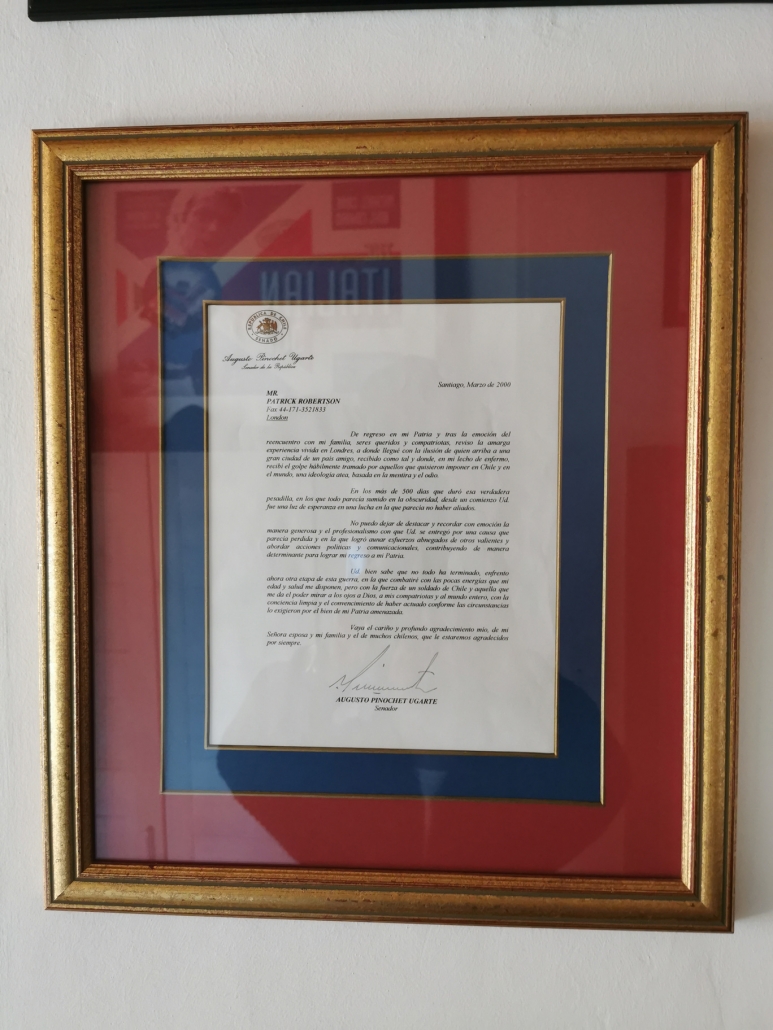Senator Augusto Pinochet

In October 1998 a-Spanish judge, Balthazar Garzón Real, issued a warrant for the arrest of Senator Augusto Pinochet, former President of Chile. The 83-year old Senator, who was convalescing in a London hospital after a back operation, was arrested late at night. At the time of his detention, he was a guest of HMG and in possession of an accredited diplomatic passport.
The Madrid court warrant, which was strenuously opposed by the Spanish government, alleged human rights abuses by the Pinochet administration. Unknown to the authorities in Spain or the UK, the list of alleged abuses was assembled by the Communist Party of Chile and was a “cut and paste” of historic denunciations that had been addressed or dismissed by the National Commission for Truth and Reconciliation in the 1990s. Joan Garcés, a Spanish communist member of the parliament of Madrid and former Revolutionary Adviser of Salvador Allende, the former president of Chile, was the link between the Chilean Communist Party and Judge Garzón, who was later convicted on unrelated criminal charges*. Garcés had been an instrumental ally of Allende during the 1970s in seeking to coerce Chile onto the side of the Soviet Union during the Cold War. Pinochet had prevented this by removing Allende in a military coup in September 1973. Although Allende commit suicide in La Moneda palace during the fighting Garcés, a Spanish national, had been apprehended and deported to Spain.
The objective of the Pinochet arrest was, firstly, to destabilise Chilean society following years of successful efforts at reconciliation. (Recent turmoil in Chile, historically the most stable country in Latin America, show that in this respect at least the Chilean communists have obtained a result.) Secondly, Garzón and Garcés sought to establish a far-reaching and controversial change in international law, under which activist left-wing lawyers acting on alleged human rights violations in any jurisdiction of which they disapproved could, in effect, secure the arrest and trial of any individual, of any nationality, anywhere in the world, including a former head of state. The new legal principle of “universal jurisdiction” would, they hoped, trump the long-established doctrine of sovereign immunity – and it nearly succeeded.
Augusto Pinochet was defended in the UK courts by a brilliant legal team led by Clare Montgomery, QC, the distinguished criminal barrister. During the protracted and sometimes abstruse legal manoeuvres, which pinged back and forth for many months, the House of Lords was forced for the first time in its thousand-year history to set aside a judgment because Lord Hoffman, one of its senior judges, had failed to declare that he was associated with Amnesty International, the co-appellant in the action against Senator Pinochet. In judgment after judgment, the House of Lords failed to reach a decision on whether to allow the extradition of Pinochet to Spain.
Outside Parliament and on the international airwaves, WorldPR orchestrated on behalf of Chilean Supporters Abroad a vigorous worldwide campaign to secure the freedom of Senator Pinochet, who was held with his wife, Dona Lucia, under house arrest in Virginia Waters, Surrey. Chief protagonist was former British prime minister Margaret Thatcher who was supported, among other parliamentarians, by Lord Lamont, former Chancellor, and a large number of Chilean activists that arrived in the UK to support the former president. The campaign culminated in a seminal speech by Lady Thatcher the 1999 Conservative Party conference in Blackpool, which dominated the party conference news and deepened the predicament of the Labour government.
After 503 days of house arrest, amidst deadlock in the Law Lords and unprecedented demonstrations in Virginia Waters by Chilean protesters from both sides, British Home Secretary Jack Straw stepped in and issued an order to release Senator Pinochet on grounds of ill-health. On 3rd March 1999, the Senator flew home on a Chilean air force jet to a rapturous welcome by his supporters.
Among PR professionals there is widespread respect for the way in which an intelligently directed campaign had changed the context of public debate to the very great benefit of the client, who was once again a free man.
(* In 2012 Balthazar Garzón was disbarred by the Supreme Court of Spain for illegally recording the meetings of defence lawyers with their clients.)
BBC Radio Interview with Patrick Robertson, BBC World Service, Witness History, 2010

